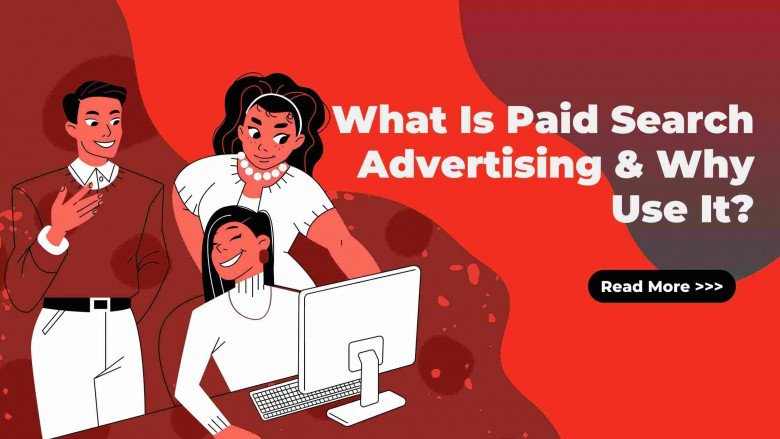
views
What Is Paid Search Advertising & Why Use It?
What is the first thing most consumers do when seeking for a new business, an answer to a query, or a solution to a problem? They use a search engine to find answers and advice. You want your company to be seen on these search engines so that customers can come to you for the best answer to their problem.
A great SEO strategy is essential for appearing on search engines. However, paid search advertising, often known as search engine marketing (SEM) or pay per click, is an important component.
Paid search allows you to be found on search engines for business-related inquiries, allowing you to drive visits to your website, create leads, and raise brand awareness.
What Is Paid Search Advertising?
To comprehend paid search advertising, you must first comprehend the structure of a search engine results page (SERP). When you enter something into a search engine (such as Google), the search engine returns a list of web pages (including their title, links, and descriptions) that are related to your search. Here is your SERP. The majority of the list is comprised of organic results: web pages identified by the search engine algorithm to be the best match for your query.
PPC ads are the results (web page names) that appear at the of your SERP and can also appear in the Google 3-pack.
While we often think of ads as visually distinct elements, paid search ads look similar to the organic listings after them, but are labeled in some way to distinguish them as an ad.
Paid search ads appear based on the keywords a user searches with and in the location they’re searching from (in addition to a variety of other factors, which we’ll get into a little later). With paid search ads, you pay for each click on your ad (which is why paid search ads are also called pay-per-click ads).
Paid search ads happen to appear on search engines, and search engines may be huge, but you don’t have to be a big business to use them. Businesses of any size and with any budget can use and benefit from paid search ads.
How Does Paid Search Work?
Paid search appears straightforward - you pay to have your business appear in search results for specified keywords - but it can be complicated. There are numerous moving parts in paid search.
So, how does paid search work?
Paid search functions similarly to an auction. When someone conducts a search, the search engine will examine the keywords in the query to see whether it contains any keywords on which advertisers are bidding. If it does, the "auction" will begin, and the search engine will consider a variety of variables, including specific keywords, budget, and quality factors, to choose which ads to display where on the page.
Why Use Paid Search?
Paid search ads can enhance your visibility on search engines, traffic to your website, and eventually sales for any business.
Here are five advantages of paid search advertising for your company:
1. Paid Search Gets You on the First Page of Google.
The top places in organic search results have limited real estate, which means there is a lot of competition. Paid search advertisements can gain you a coveted spot on Google's first page, whether you're a new business or an existing one just starting to build your online profile.
Furthermore, 41% of clicks are directed to the first three paid advertisements spots on the search results page.
2. Paid Search Works Fast
SEO, the other digital marketing method that gets you seen on search engines, takes time. It takes time to improve your chances of ranking organically in search engines for relevant inquiries. Paid search, on the other hand, works quickly. You can begin appearing on search engines almost immediately, allowing you to quickly catch the attention of interested searchers.
3. Paid Search Helps Maintain Your Reputation
Users will notice that you paid to be on Google's top page if you employ sponsored search ads. This, however, will not harm your company's reputation. Search engines, like organic rankings, have a set of rules and considerations in place for paid rankings to ensure that the advertising they display to their visitors is relevant and trustworthy.
Your ad rank is not simply determined by how much you bid. Google and other search engines also consider your Quality Score, which measures how relevant your term is to your ad text and what a user is looking for.
4. People Who Click on Paid Search Ads are Ready to Buy
Your paid search advertising appears to users who are specifically looking for your products or services, indicating that they are not just passing by or have an unrelated interest. They're ready to buy - or, at the very least, to learn more and then buy.
According to studies, sponsored search ads receive 65% of clicks for searches with high purchase intent.
5. Paid Search Provides Robust Analytics
Search engines such as Google, Yahoo, and Bing offer free real-time data and analytics to those that use their advertising platforms. You can discover a lot about folks who click on your ad using this information, including:
-
Where that person can be found.
-
How long people stayed on your site.
-
What pages on your website they visited.
-
What kind of equipment were they using? (mobile, tablet, laptop)
This precise data allows you to know exactly what you're getting for every dollar spent on paid search. Use it to make your advertising more efficient, to continuously enhance your efforts, and to achieve the desired outcomes.
What Is Paid Search Advertising & Why Use It?













Comments
0 comment